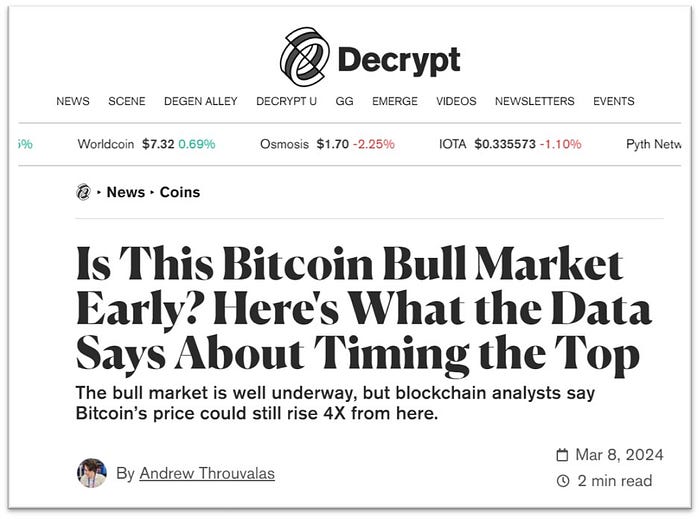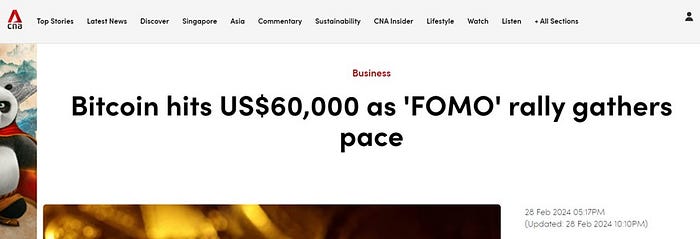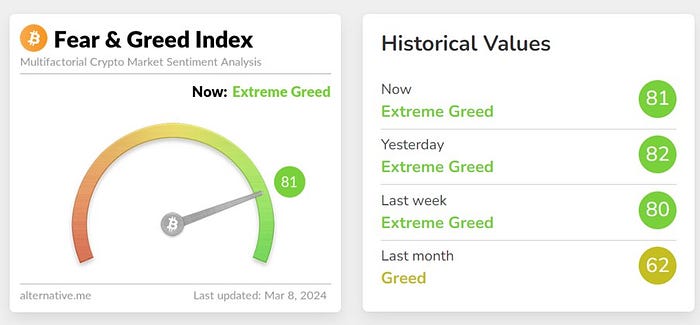We already know how Bitcoin went crazy in the last weeks, mostly thanks to the approval of U.S. Bitcoin spot exchange-traded products.
When I started making notes for this story on the morning of 5 March (GMT +8), it had surged past US$68,000, putting it in spitting distance of its historic high of US$68,999.99. Headlines from many news outlets started dizzily participating some kind of mass countdown — will it or won't it break its 2021 record?
Eventually, as we know, Bitcoin did break its 2021 high, surging to US$69,202 later that day and then — to no-one's surprise, subsiding by 7% before climbing up again in the next days.
Speculation remains rife on its future trajectory, with many experts (whatever that means) still being very positive.


Some commentators were more cautious, but these seemed to be in the minority.

Another day, another speculative bubble, another set of fortunes made or lost.
So why should we care?
Social media and the non-stop news cycle: We are being smothered with content
"Today's active participants are neither more emotionally stable nor better taught than when I was in school." Warren Buffet
Speculative behaviour by retail investors is not new, but such behaviour is easier than ever to manipulate in this day and age. Of course, we all know we shouldn't invest more than we can afford to lose, we should be doing our own research, yadda yadda yadda.
But how much do the design of communication systems these days allow us to do that?
Social media algorithms and non-stop news cycles make it extremely easy to find out about things. Their business model relies on content being repeatedly pushed in front of as many eyeballs as possible (I acknowledge the irony of me writing this on Medium, also a social media platform.)
But while we're served many piping hot dishes of content, very quickly, we might not necessarily find it easier to savour each one; in other words, to understand, process, question and reflect on what we've been updated on.
Over the past week, I watched the Bitcoin situation with the fascinated horror of someone standing outside a grab-all-you-can Black Friday sale. It filled me both with anxiety and an almost-irresistible urge to leap into the fray as well. The FOMO was very real. "BUY!" The baboon part of my brain shrieked. "Quick, you could make a few thousand dollars!"
For context — I have been an investor for decades. I started investing from the time I got my second paycheck 20 years ago. I am a staunch believer in researching fundamentals and thoughtful decision-making.
And yet the fever-pitch frenzy whipped up by headlines nearly got to me, because they were not intended to engender careful research and thoughtful decision-making. They were meant to generate excitement and FOMO.
Welcome to FOMO: Yes it's quite deliberate

Researchers at Cambridge have been looking into the relationship between crypto and FOMO, noting that the two seem to be bedfellows — a 2022 New York Times Money feature remarked, "Everyone Has Crypto FOMO". In the same year, several crypto exchange advertisements played at the NFL Superbowl with "Don't Miss Out" themes.
"The use of FOMO in crypto exchange advertisements is an example of how institutions expect emotions to play a role in investment decisions," the study concluded.
It's not just institutional advertisements. We've seen news headlines above already; here are more examples from YouTube (which I actually use a lot for long-form content and deep dives). Crypto video thumbnails are somehow overrun with a surfeit of exclamation points, big fonts, shouty titles and urgent calls-to-action.

So yes, we are supposed to go cuckoo over crypto. This is tragi-comically demonstrated by the Crypto Fear and Greed sentiment analysis tool developed by Alternative.Me (modelled after a similar tool by CNN by stocks).
Calculated with a combination of factors like market volatility, momentum and volume, social media sentiment, Bitcoin's market dominance, and Google Trends data, the Fear and Greed Index drily states, "The crypto market behaviour is very emotional."
By the way, the index currently shows "Extreme Greed".

We're really not prepared for all this
Adding to this problem is that as a society, our public institutions are just not ready to deal with crypto, blockchain and other web3 tech.
At schools, for example — educational curriculum has yet to catch up with the new disruptions that are coming to us fast and furious.
As an ex-teacher who worked in the 2010s, it was already difficult enough for teachers to understand and critically process how social media (back then it was Facebook) was changing the way we communicated, much less provide solid guidance for our students. Things are much more complex for teachers working in the era of crypto-mania, AI deepfakes and TikTok.
Very worrying, considering more than 40% of Gen Zs cite FOMO as the reason why they invest, primarily learned through social media, with "crypto as the gateway drug".
Governing bodies are also still playing catch-up as well. While countries like Japan and those in Europe have passed legislation to expand regulation over digital assets and payments, the US is still "struggling to create a coherent regulatory framework as 'politicians are still getting up to speed on cryptocurrency and the education gap remains large,' said Cody Carbone, chief policy officer at the Chamber of Digital Commerce."
This is leaving many of us in a situation in which the general populace is simultaneously more exposed than ever to speculative opportunities and even scams, and yet woefully ill-equipped to assess these opportunities and understand against their risks.
"For whatever reasons, markets now exhibit far more casino-like behavior than they did when I was young." Warren Buffet
There are real people's livelihoods at stake here.
Investing is a very real, very important way to grow wealth and set ourselves up for the future. But situations like these muddy the waters between investment and speculation.
But we can all just look away, can't we?
Some can, but many won't be able to.
That's because this furore is symptomatic of some very real issues with our economy and society today. FOMO, speculation, scams — they are all rooted in the same fear, which is that people are increasing worried about being able to thrive or even get by.
The World Bank released a sobering report: "As the world nears the midpoint of what was intended to be a transformative decade for development, the global economy is set to rack up a sorry record by the end of 2024 — the slowest half-decade of GDP growth in 30 years."
The report also predicted that by the end of 2024, people in about one out of every four developing countries and around 40% of low-income countries will still be poorer than they were before the COVID pandemic in 2019.
In developed economies, growth will slow to 1.2% this year from 1.5% in 2023.
So the old capitalistic monuments, already deeply flawed and un-inclusive to begin with, are likely to shelter even less people in the coming years, and in response, people are seeking a temporary roof under shiny new structures like Bitcoin or other alt-coins.
Some of these structures, flimsily constructed on a wish and a dream, will crumble and crush everyone under their roof.
The European Central Bank has warned that "for society, a renewed boom-bust cycle of bitcoin is a dire perspective. And the collateral damage will be massive, including the environmental damage and the ultimate redistribution of wealth at the expense of the less sophisticated."
We already know the danger of running after cryto-mania, or all types of new tech hype. For a large number of people, it will not end well for long-term. Remember: who stands to gain when they can persuade a large number of people to disengage their brakes and dash madly after something?
But unless we fix several huge systemic problems in our society today, we're likely fated to continue getting stuck under the wheels of large corporations and organisations chasing after their own gain.
I don't have a solution for solving systemic issues, but I write stories like these to cast a light on them, and hopefully add my voice to many others that remind us how FOMO is a created product that you don't have to buy.
Stay safe out there!
Thank you for reading! If you enjoyed my story and would like to support my work, please consider Buying me a Coffee.


